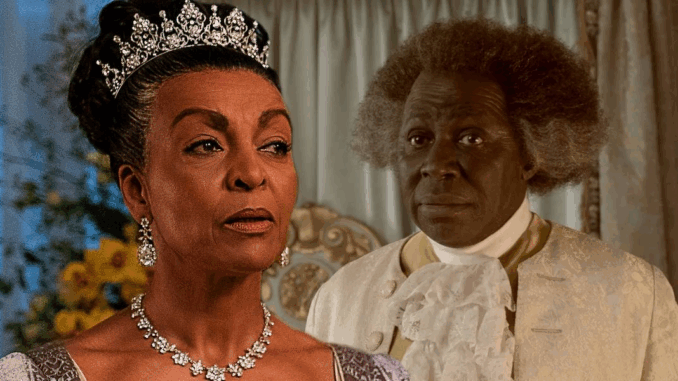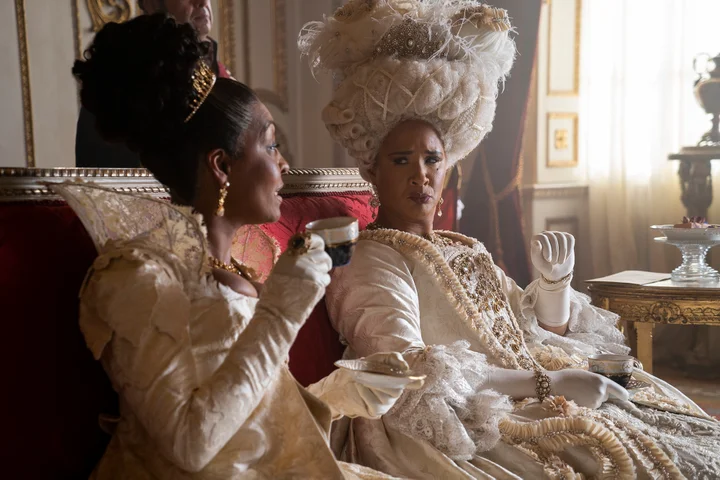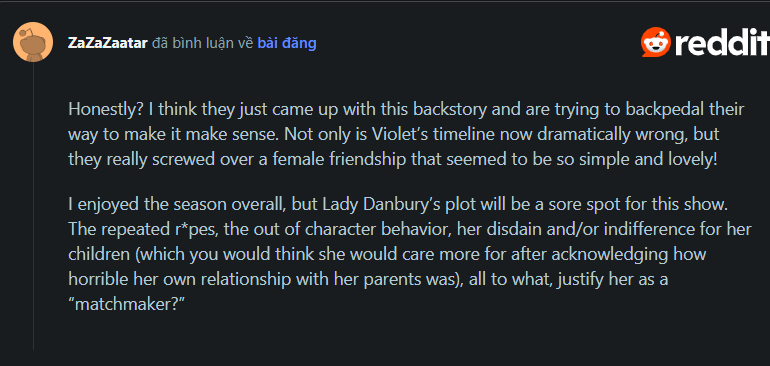
After a stunning run for three seasons, Bridgerton is all set to once again return to the screens with a fourth season that is already as greatly anticipated as ever. While a lot of fans are looking forward to other storylines to materialize, including the show’s focus on Benedict’s love story, some are also hoping that the series does something about Lady Danbury’s backstory.
In the respective series’ prequel spin-off show Queen Charlotte: A Bridgerton Story, a lot was hinted about the respective character’s past, and now, we are hoping the original Netflix series doesn’t whitewash her backstory just like that and instead plods more on it. Because if it does, then the show will inevitably end up proving that it cares more about corsets than characters.
Bridgerton S4 should NOT whitewash Lady Danbury’s backstory
When Lady Danbury formally known as Agatha Danbury and portrayed with gravitas by Adjoa Andoh was first introduced in Bridgerton, she appeared as a dignified, no-nonsense widow with sharp wit and considerable social influence. A respected figure within the ton and a loyal confidante to Violet Bridgerton (Ruth Gemmell), Lady Danbury initially seemed like a character defined more by her present status than by her past. But the prequel series Queen Charlotte changed everything. It gave audiences a rare and necessary glimpse beneath the surface, revealing the layers of pain, courage, and resilience that shaped her into the formidable woman we now see on screen.
In Queen Charlotte, we meet a younger Agatha Danbury, portrayed with nuance and vulnerability by Arsema Thomas. Recently widowed and still very much bound by the societal expectations of her time, young Lady Danbury’s journey is far more complex than initially imagined. Her story unfolds against the backdrop of the “Great Experiment”—a royal initiative that attempted to integrate people of color into the aristocracy, granting them titles and societal standing. This wasn’t merely a political decision within the show’s universe; it was a seismic shift that challenged the very foundations of Britain’s rigid class and racial hierarchies.

As part of this shifting landscape, Agatha Danbury’s life is depicted as a delicate dance between survival and defiance. One of the most controversial and telling moments of her past is her affair with Lord Ledger, Violet Bridgerton’s father (played by Keir Charles). Their connection is portrayed not merely as a romantic interlude, but as a deeply human, deeply complicated relationship shaped by loneliness, grief, and the longing for dignity in a world that refused to see her as an equal. This relationship also creates subtle tension between Violet and Lady Danbury in the present-day Bridgerton timeline, hinting at emotional undercurrents yet to be fully explored.
What Queen Charlotte succeeds in doing is granting Lady Danbury the emotional and historical depth that the original Bridgerton series had only hinted at. It frames her resilience not as a trait born of privilege, but as a hard-won armor forged through systemic exclusion and personal sacrifice. Her poise, intelligence, and influence are not just products of noble birth or social experience they are the result of living through a time when her identity was both scrutinized and weaponized.
However, as Bridgerton prepares for its fourth season, there is a growing concern that the main series may choose to gloss over or even erase these crucial elements of Lady Danbury’s identity. There is a real risk that her character could be reduced once again to the role of a wise advisor, stripped of the layered racial and social history that makes her one of the most compelling characters in the Bridgerton universe.
To whitewash Lady Danbury’s backstory—by ignoring the racial realities she faced or minimizing her experience as a Black woman navigating 18th-century English high society—would be a disservice not only to the character but to the storytelling ethos of the series itself. Her arc deserves to be treated with the same care, nuance, and authenticity that was afforded to her in Queen Charlotte. The richness of her past is not an optional subplot; it is central to who she is.
As Bridgerton continues to evolve, the hope remains that season 4 will not shy away from this complexity. On the contrary, it should embrace it. Lady Danbury’s story is not just one of personal triumph—it is a mirror reflecting the broader struggles of identity, race, and power in a world that was never built for her to thrive. And yet, she did. That legacy deserves not only remembrance, but continuation.
Fans react to Lady Danbury’s past in Queen Charlotte
While the forthcoming season of the original show needs to do something about Agatha Danbury’s backstory rather than downplaying it, there have been debates on Reddit among fans about the same. For one, one of these debates following the prequel’s revelation had fans trying to reason the respective characters’ actions of meddling in the Bridgerton children’s love lives.
As Redditor r/Confident-Fall-6541 posted, one of the potential reasons behind Danbury’s doing this to make sure the children have happy endings could be that she might be overcompensating for her guilt to make sure they get the happily ever after that she wished to have. Also, “to ensure that all of Lord Ledger’s grandchildren live a happy and fulfilling life.”
This brought about quite a few arguments from the other fans, some of whom felt that this backstory was only given birth just for the sake of it, and now the show creators are “trying to backpedal their way to make it make sense.” Some others, in the meanwhile, argued that she wasn’t overcompensating; she’s just really fond of them all. All in all, here’s what they had to say:

Needless to say, all of these fan reactions are further proof that the Netflix series needs to delve more into the backstory of Agatha Danbury. Because if it doesn’t, then it would not only make it feel like they really value corsets over characters but also be a disservice to the audience, particularly Black viewers, who appreciate seeing their history and experiences reflected on screen.